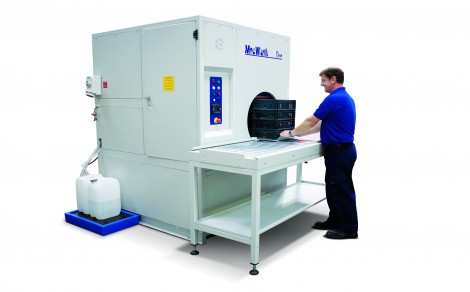- Home » Editorial » Hydraulics
Keep it clean

Increased profitability and component cleanliness is essential, says MecWash Systems.
Demand for ever finer tolerances in engineered components is placing pressure on manufacturers to meet increasingly stringent customer and industry cleanliness requirements, while still maintaining profitability.
Advances in technology within the parts cleaning industry give functional improvements and greater efficiencies that make such objectives more than achievable in most situations.
However, despite these improvements many manufacturers are failing to take advantage of the potential, according to MecWash Systems, the designer and manufacturer of aqueous parts cleaning and degreasing equipment.
Achievable cleanliness goals
“We have customers who have been required to provide increases in the levels of cleanliness of engineered components of 25 to 50% over the past year, within sectors such as automotive and general engineering,” said John Pattison, managing director of MecWash Systems, based at Tewkesbury, Gloucestershire. “This is quite significant and might seem daunting to many manufacturers, but in most cases, it is more than achievable. Combine the latest cleaning systems with a robust and efficient cleaning regime and they can achieve the optimum levels required for customer and industry standards, while achieving dramatic efficiencies, reducing costs and ensuring profitability.”
Alan Atkinson of MecWash Systems explained how one UK client manufacturing hydraulic valves had been required by a customer to increase levels of product cleanliness by 40%. “The challenge was how could this be achieved cost effectively,” said Atkinson. “They required new equipment and the MecWash Duo was suited for the type of products being cleaned.”
40%+ improvement in cleanliness
Atkinson continued: “We worked with them on a set of trials that also involved our in-house laboratory and chemist. The trials resulted in more than a 40% improvement in cleanliness achieved. This ensured the customer was able to exceed the standards it had been set, while continuing to enjoy efficiencies in water and energy usage.”
The Duo process includes immersion washing, which provides higher standards of cleaning by full solution contact with all component surfaces. In addition, it has a spray wash, and a re-circulating heated spray rinse, which provides a high standard of surface finish, removing detergent residues left by the wash solution. This process is completed with a hot air dry.
A similar example is a US-based MecWash customer, Stewart Engineering. One of its customers wanted to raise the standards of cleanliness on finished products. The tighter cleanliness specifications demanded meant that particles over 500 microns were no longer acceptable, gravimetric weight gain would be restricted to 25 milligrams, and no amount of abrasive material, in this case residual honing grit, would be allowed at all.
Bill Westbrook, North American operations manager for MecWash, said: “Where 10 years ago particle sizes of 1000 microns captured in a millipore patch test might have been acceptable, today it is not uncommon for heavy equipment OEMs to demand maximum particle sizes of 500 microns or even less. This was the requirement from this customer to meet the new gravimetric limits on components that are critical to the fuel, oil, and airflow inside of engines, pumps, and compressors.”
Bespoke solutions
The customer commissioned a MecWash Maxi. Pattison explained: “Due to the Maxi’s high performance and huge cleaning capacity, we were able to offer Stewart a system that could both achieve their customer’s cleanliness requirements and surpass Stewart’s goal of cleaning 80 turbo bearing housings per hour. For many customers our existing systems such as the Duo and MWX400 can be configured to meet their needs, but if not we will work with them to create totally bespoke solutions.”
-
PPMA 2025
23 September, 2025, 9:30 - 25 September, 2025, 16:00
NEC, Birmingham UK -
Advanced Engineering Show 2025
29 October, 2025, 9:00 - 30 October, 2025, 16:00
NEC, Birmingham UK










